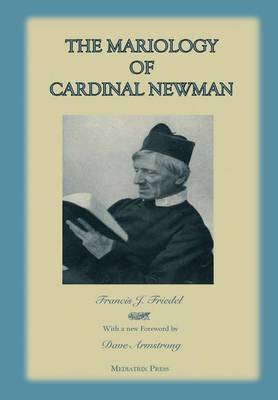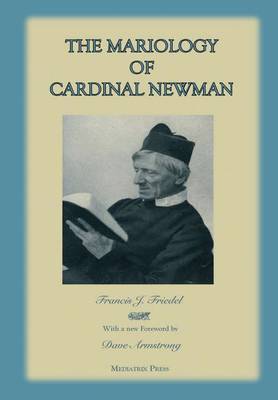
Door een staking bij bpost kan je online bestelling op dit moment iets langer onderweg zijn dan voorzien. Dringend iets nodig? Onze winkels ontvangen jou met open armen!
- Afhalen na 1 uur in een winkel met voorraad
- Gratis thuislevering in België vanaf € 30
- Ruim aanbod met 7 miljoen producten
Door een staking bij bpost kan je online bestelling op dit moment iets langer onderweg zijn dan voorzien. Dringend iets nodig? Onze winkels ontvangen jou met open armen!
- Afhalen na 1 uur in een winkel met voorraad
- Gratis thuislevering in België vanaf € 30
- Ruim aanbod met 7 miljoen producten
Zoeken
The Mariology of Cardinal Newman
Mediatrix Press, Francis J Friedel, Dave Armstrong (Foreword)
Hardcover | Engels
€ 59,45
+ 118 punten
Omschrijving
The Mariology of Cardinal Newman is a study of Blessed John Henry Newman's journey from a cautious intellectual acceptance of limited Marian doctrines while an Anglican to his full acceptance and development of Marian doctrine as a Catholic. Newman was a master of the English language and possessed a fine intellectual mind, but at the same time, because of his deep humility, he could enter into true devotion to the Blessed Virgin Mary. The Rev. Friedel draws from all of Newman's work to provide a truly masterful treatise establishing not only Newman's views to doctrine, but Newman as a devout client of our Blessed Lady. He divides the first part of the book into two periods: Newman's life as an Anglican and his developing attitude toward Mary; then his views when he became a Catholic and how this developed in his devotional life. Then, in the second part, the author examines the specific doctrine's of Mary which Newman treated on.
Specificaties
Betrokkenen
- Auteur(s):
- Uitgeverij:
Inhoud
- Aantal bladzijden:
- 352
- Taal:
- Engels
Eigenschappen
- Productcode (EAN):
- 9780359589234
- Verschijningsdatum:
- 13/04/2019
- Uitvoering:
- Hardcover
- Formaat:
- Genaaid
- Afmetingen:
- 152 mm x 229 mm
- Gewicht:
- 671 g

Alleen bij Standaard Boekhandel
+ 118 punten op je klantenkaart van Standaard Boekhandel
Beoordelingen
We publiceren alleen reviews die voldoen aan de voorwaarden voor reviews. Bekijk onze voorwaarden voor reviews.











